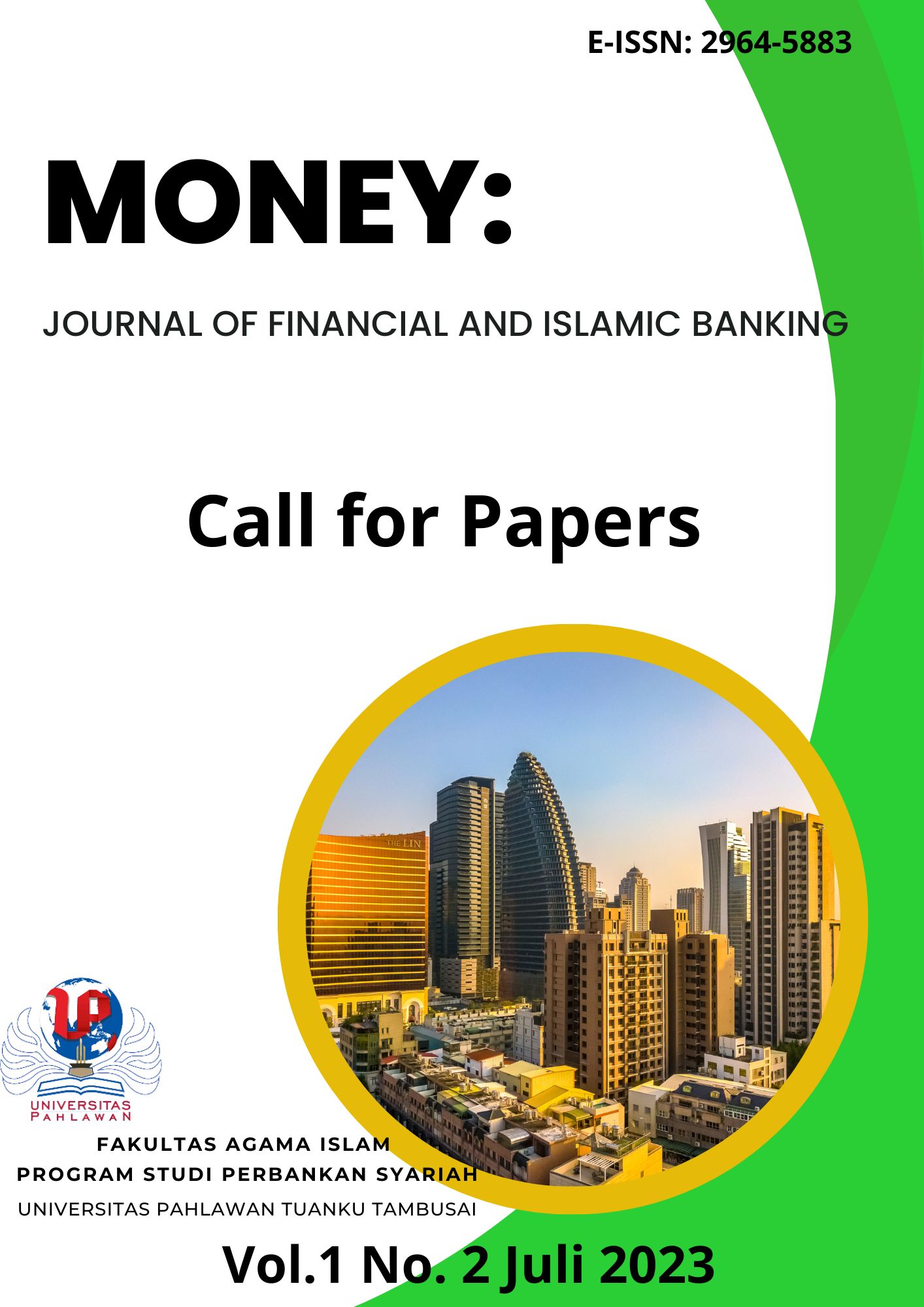Considering Dawam Raharjo as the Foundation of Sharia Digital Business Ethics
DOI:
https://doi.org/10.31004/money.v1i2.15991Keywords:
dawam rahardjo, sharia digital economy, islamic business ethics, sharia fintechAbstract
Purpose - This research aims to investigate the application of ethics in Sharia digital business and its potential impact on consumer trust and satisfaction in the context of Islamic fintech. The rapid expansion of Sharia fintech has led to the need for strong business ethics to guide and ensure the provision of quality services in the industry. Islamic business ethics, based on Sharia principles, play a crucial role in maintaining the continuity of Sharia business and promoting healthy competition. Additionally, the study explores the potential of Sharia digital business ethics in empowering society and supporting social empowerment initiatives within the framework of Islamic economics. Method – The research methodology employed in this study is qualitative content analysis, utilizing the works of Dawam Rahardjo as primary data sources. The data collection involves the analysis of written documents, including books authored by Rahardjo. The analysis focuses on identifying the compatibility and relevance between the draft ethical principles proposed by Rahardjo and the applied values in Sharia digital business. The life history approach is also employed to gain insights into Rahardjo's perspectives on business ethics. Result– The literature review examines the perspectives of Dawam Rahardjo, a prominent figure in Islamic economics, on Islamic business ethics. Rahardjo emphasizes the importance of fairness, transparency, responsibility, and accountability in business operations. The concept of "ta'awwun" (cooperation) is also highlighted as a key principle in Islamic economics. The review further discusses the ethical principles and values that underpin Sharia digital business, such as fairness, honesty, transparency, trust, and social responsibility. Jelaskan hasil yang diperoleh dari penelitian ini Originality (Novelty) - This research integrates the perspectives of Dawam Rahardjo, a prominent figure in Islamic economics and business ethics, to provide a comprehensive understanding of the ethical principles that should guide Sharia digital business. By analyzing Rahardjo's works and examining the compatibility and relevance of his ethical framework in the context of Sharia digital business, this research expands on the existing knowledge and offers practical insights for digital companies operating in accordance with Sharia principles. Implications – The findings of this research will contribute to a deeper understanding of the application of ethics in Sharia digital business and its potential effects on consumer trust and satisfaction. The study will provide insights into the importance of ethics in maintaining long-lasting consumer confidence, promoting ethical practices in digital business operations, and empowering society. Moreover, the research will offer guidelines and recommendations for sharia-compliant digital companies to establish a loyal customer base and contribute to social well-being.References
Ade Fauzi. (2015). Pespektif Etika Bisnis Islam. 5, 95–116.
Ajuna, H. N. A. (2022). Internalisasi Islamic Business Ethic Pada Fintech Syariah. Finansha- Journal of Sharia Financial Management. https://doi.org/10.15575/fjsfm.v3i2.21066.
Asmuni, A., & Arifin, N. A. I. (2023). Implementasi Teori Maqashid Sebagai Upaya Penguatan Kompetensi Hakim Dalam Mengadili Perkara Ekonomi Syariah Digital. Jarvic. https://doi.org/10.58684/jarvic.v1i4.29.
Fauzi, A. (2015). Pemikiran Etika Bisnis M. Dawam Rahardjo. Penerbit A-Empat. https://books.google.co.id/books?id=ziVXEAAAQBAJ.
Husain Insawan. (2020). Pemikiran Ekonomi Islam M. Dawam Rahardjo. Researchgate.Net, January 2012.
Lubis, R., Nawawi, M. K., & Hakiem, H. (2021). Penerapan Etika Bisnis Islam Dalam Transaksi Jual Beli Pada Wirausaha Muslim. El-Mal Jurnal Kajian Ekonomi & Bisnis Islam. https://doi.org/10.47467/elmal.v2i3.622.
Mufidah, A., Syafaq, H., & Yudha, A. T. R. C. (2021). Integrated Economic Empowerment: Evidence in the Religious Area of Gusdur’s Tomb. Jurnal Ekonomi Syariah Teori Dan Terapan. https://doi.org/10.20473/vol8iss20216pp785-796.
Mufrih, A. N., & Hadiroh, J. (2022). Progresifitas Fatwa Dan Regulasi Ekonomi Syariah Terhadap Pembangunan Ekonomi Nasional. Alhamra Jurnal Studi Islam. https://doi.org/10.30595/ajsi.v3i2.14487.
Muzdalifa, I., Rahma, I. A., & Novalia, B. G. (2018). Peran Fintech Dalam Meningkatkan Keuangan Inklusif Pada UMKM Di Indonesia (Pendekatan Keuangan Syariah). Jurnal Masharif Al-Syariah Jurnal Ekonomi Dan Perbankan Syariah. https://doi.org/10.30651/jms.v3i1.1618.
Nur, M. E. (2018). Dakwah Sosial Ekonomi Dalam Pandangan Dawam Rahardjo. Jurnal Ilmu Dakwah, 37(1), 1. https://doi.org/10.21580/jid.v37.1.2597.
Nurhadi, N. (2019). The Importance of Maqashid Sharia as a Theory in Islamic Economic Business Operations. International Journal of Islamic Business and Economics (Ijibec). https://doi.org/10.28918/ijibec.v3i2.1635.
Prasnowo, M. A., Aziz, N. M. S., Indrasari, M., Pamuji, N. E., & Prasetyo, N. D. (2023). Membangun Ekosistem Kewirausahaan Digital Syariah Bagi UMKM Di Wilayah Jawa Timur Dan Nusa Tenggara Barat. Prapanca Jurnal Abdimas. https://doi.org/10.37826/prapanca.v3i1.428.
Puspita, A. N., & Syah, T. A. (2022). Sharia Economic Issues in the Perspective of M. Dawam Rahardjo. AJIRSS: Asian Journal of Innovative Research in Social Science, 1(1), 1–5. https://doi.org/10.53866/ajirss.v1i1.52.
Rahardjo, M. D. (1990). Etika ekonomi dan manajemen. Tiara Wacana, 1990.
Rahardjo, M. D. (2015). Arsitektur Ekonomi Islam: Menuju Kesejahteraan Sosial. Mizan: Bandung.
Sari, W. S. (2022). Implementasi Prinsip Pengembangan Sumber Daya Manusia (Sdm) Dalam Penerapannya Dibeberapa Bidang Berbasis Ekonomi Dan Syariah. Karismapro. https://doi.org/10.53675/karismapro.v13i1.254.
Sudirman, W. F. R., Sari, E. N. ., Reza, S. ., & Syaipudin, M. . (2023). Apakah fintech lending berpengaruh terhadap kinerja bank syariah di indonesia?. MONEY: JOURNAL OF FINANCIAL AND ISLAMIC BANKING, 1(2), 81–90. https://doi.org/10.31004/money.v1i2.15357.
Tobing, I. F., & Marliyah, M. (2023). Peran Bisnis Online Terhadap Pasar Ekonomi Digital Dalam Perspektif Syariah. Ekonom. https://doi.org/10.58432/ekonom.v3i1.727.
Wulandari, S., & Nasik, K. (2021). Menelisik Perbedaan Mekanisme Sistem Peer to Peer Lending Pada Fintech Konvensional Dan Fintech Syariah Di Indonesia. Nuris Journal of Education and Islamic Studies. https://doi.org/10.52620/jeis.v1i2.7.









